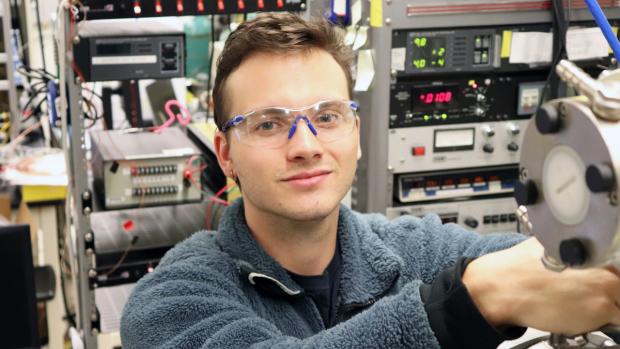Bound for Beijing
Recent grad receives Fulbright Research Award to develop environmental monitoring

Caspar Lant at the Oak Ridge National Laboratory last summer
A former leader on the Vertically Integrated Projects (VIP) initiative devoted to smart cities technology, Caspar Lant (BS '19) garnered a $10,000 NYU Office of Sustainability Green Grant and spent two weeks two summers ago in Shanghai, modifying and deploying air-quality monitors in collaboration with the U.N. Environmental Programme.
He’s now got his sights set on a different Asian capital, Beijing, thanks to winning a one-year Fulbright Research Award. While there, he’ll be developing and deploying next-generation air-quality sensors, with the goal of making them smaller, cheaper, and more sustainable. “My aim is that they’ll be solar-powered and that they’ll communicate with each other in what’s called a mesh network, which is highly efficient,” he explains. “I also hope to learn more about two other branches of environmental monitoring — noise and light."
Lant — who has also been the recipient of a Department of Energy research fellowship at the Oak Ridge National Laboratory and a fellowship that allowed him to conduct research at the Leibnitz Institute in Berlin, Germany — is undaunted by the prospect of relocating for a full year. “Engineering issues like sustainability and transportation exist globally, so my skills can be useful from one country to the next,” he says, “and one of the great things about the sciences in general is that the topics are readily transferable from one country to another. There isn’t the kind of cultural dependence that one might expect in, say, art history — which I also happen to be very interested in!”
Lant, who currently teaches physics as an adjunct at the NYU College of Arts and Science, doesn’t discount the challenges of transnational collaboration (“Even coordinating my Fulbright application meant working with people in at least four different time zones, and answering midnight WeChat messages from my affiliate at Chinese Academy of Sciences became the norm,” he admits), but he feels the benefits are well worth it. “I’d encourage everyone to apply for programs like the Fulbright, and I hope my future career continues to involve this level of international engagement,” he says.




